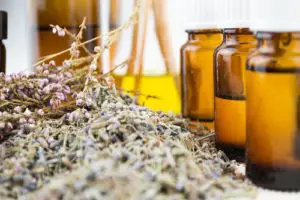Getting poison ivy, oak, or sumac can be a miserable experience. The rash, itchiness, and irritation that comes from these poisonous plants can take weeks to fully dissipate.
The good thing is, unless you are allergic or under extreme circumstances, the symptoms are temporary, non-life threatening, and not transferable to other humans. Still, you might be desperate to find relief after coming into contact with poison ivy, oak, or sumac.
And natural remedies like essential oils can provide immense relief and quicker recovery.
[amazon box=”B01161IL20″]
Essential Oils For Poison Ivy and Rash
The essential oils in this article can help with all three of these poisonous plants (ivy, oak, and sumac), because they address the root problem – skin rash.
When you come into contact with poison ivy, oak, or sumac, skin rash is your biggest risk. If you suspect that you’ve become vulnerable, watch out for these symptoms:
- Skin redness
- Skin swelling
- Skin itchiness
- Minor or major outbreaks of blisters.
While extreme outbreaks may require medical treatment, a little bit of self-care will eliminate the rash within one to two weeks (sometimes longer). Before detailing the best essential oils for poison ivy rash, here are some other common treatment methods:
- Apply cold compresses to affected areas of the skin.
- Take an oatmeal bath.
- Use topical treatments, like calamine lotion, that are aimed at reducing skin itchiness.
- While personally we always prefer natural solutions, if you want to take a more traditional route, oral antihistamines can help relieve symptoms.
Now we’ll discuss which essential oils will help treat your poison ivy, oak, and sumac symptoms.
[amazon box=”B06XRLR9RQ”]
 But first, a word of caution: There are potential risks to keep in mind when using essential oils for poison ivy. Essential oils are very concentrated, and so the oils can increase inflammation for people with highly sensitive skin. That’s why it’s important to dilute with a carrier oil and perform a “spot-test” on a small area of your skin. Regardless, if you have concerns it’s always best to consult a physician.
But first, a word of caution: There are potential risks to keep in mind when using essential oils for poison ivy. Essential oils are very concentrated, and so the oils can increase inflammation for people with highly sensitive skin. That’s why it’s important to dilute with a carrier oil and perform a “spot-test” on a small area of your skin. Regardless, if you have concerns it’s always best to consult a physician.
- Lavender: Popularly known for its restorative properties, lavender can ease inflammation and expedite the healing process.
- Myrrh: By helping to hydrate your skin, myrrh can soothe the pain that can accompany skin rashes.
- Peppermint: If you’re looking to reduce inflammation and soothe a burning sensation on the skin, there isn’t an oil that’s much better than peppermint.
- Eucalyptus: Boasting a plethora of potent active ingredients (including menthol), eucalyptus can reduce the pain and heat from poison ivy rash.
- Rose: An excellent oil for controlling the immune system, rose can curb the symptoms from allergic reactions.
- Chamomile: Safe for all ages, chamomile offers calming benefits that are also effective at relieving itchy and swollen rashes.
How to Apply Your Oils
When it comes to easing your poison ivy symptoms with essential oils, there are a number ways you can do it. Here are a few basic applications to consider:
- Mix two to three drops of oil in one oz. of water. Dip a cotton ball into the mixture and gently rub over the rash to disinfect and cleanse.
- Combine four drops of oil with aloe vera gel and gently rub on the affected area to speed up recovery.
- Combine eight drops of oil with 5 oz. of witch hazel in a spray bottle and spray on the affected area.
- Add two tsp of coconut oil, one cup of oats, and 10 drops of essential oil to a bath and soak for about 20 minutes. This is ideal for situations where you have rashes on several different parts of your body.
- Add 10 drops of oil to a bowl of cold water and stir up well. Dip a soft cloth into the liquid, wring it out, and apply to affected areas.
[amazon box=”B0128HRZOG”]
So there you have it. Essential oils can work wonders for relieving the horrible symptoms that accompany poison ivy, oak, and sumac.



Thank you so much for the natural remedies!!!